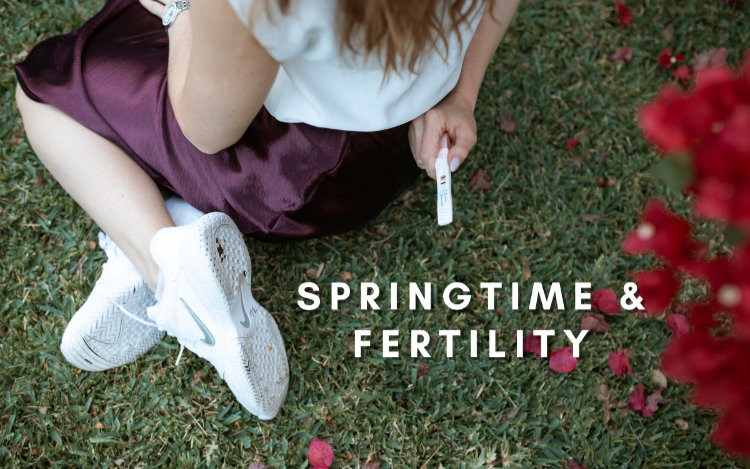Springtime is certainly beautiful. Flowers bloom as warm days and cool nights bring a sigh of relief that winter is over, and many animals, including birds and bunnies, begin to multiply as they build their families.
Spring also marks the equinox as well as several holidays, including Ostara, an ancient Pagan holiday that honors rebirth and fertility, and Easter, a Christian holiday that bears many resemblances to the ancient celebrations of life and new beginnings.
With all this magical folklore around fertility and spring, it follows that spring is a great time for you to try for a pregnancy—or is it?
In this article, we’ll discuss the science behind springtime and fertility, along with some advice for how to promote fertility in you and your partner.
Spring may bring out the strong swimmers.
Although many cultures often looked to women regarding the problem of infertility, struggling to conceive a child isn’t just the fault of the egg. In fact, it’s estimated that sperm cells are just as responsible for infertility as egg cells.
So, what can spring do for these little swimmers?
The American Journal of Obstetrics and Gynecology published this 2013 study, which concludes that humans experience a “seasonal sperm pattern” where semen is faster and stronger in winter and spring months and weaker during summer and fall.
Although more research studies are needed to confirm these findings, this study suggests that spring is a good season for viable pregnancies.
No evidence suggests that women are more fertile in the spring.
Despite our many associations with springtime and fertility, there is no current evidence that spring makes women more fertile.
People with uteruses experience a menstrual cycle, and we can predict fertility within the 28-or-so days of that cycle, but nothing suggests that you’re more or less fertile throughout the four seasons.
Your birth month could affect your fertility.
However, if you were born in the spring, you might have a better chance of getting pregnant compared to people born in the summer.
Researchers aren’t exactly sure why they found these results, but they believe it could be due to unique stresses that summer babies face during fetal development (such as an increased risk of infection and poor nutrition).
In fact, summer babies with uteruses tend to have 13% less of their own babies than people born in other months!
How to boost your fertility naturally—whether it’s springtime or not.
Regardless of when you were born or what season it is now, there are plenty of ways to boost your fertility naturally.
Here are some of the best tips for increasing your fertility.
Eat a healthier diet. By healthier, we mean more fiber, more antioxidants, more whole grains, and more fresh vegetables. Cut out as many processed foods as possible, especially processed carbs and sugars.
Substitute clean, unprocessed plant proteins for animal proteins. You don’t need to stick to a strict vegan diet, but incorporating more plant proteins into your diet could increase your fertility.
Take your vitamins. Vitamin deficiencies are extremely common in the US—over 30% of Americans are at risk of being vitamin deficient. And researchers estimate that ovulatory infertility could be reduced by 20% with the introduction of a multivitamin.
Be active. It’s no secret that activity is great for your health, so it shouldn’t come as a surprise that exercise can increase your fertility, whether you carry eggs or sperm.
Destress. Stress wreaks all kinds of havoc in the body—including infertility. So, take time to relax. If needed, consider counseling to help you better manage stress, including anxiety and depression.
Avoid drugs and alcohol. That includes caffeine. Cutting out coffee, excessive alcohol, and other drugs that can damage your body is a positive step towards a successful pregnancy.
Trying to get pregnant? Here’s what you should know about infertility.
If you’re trying for a baby right now or planning a pregnancy, you should know that infertility affects 1 in 8 couples. But it’s not something you should be afraid of.
Infertility is diagnosed when someone is unable:
• to get pregnant after one or more years of trying (and is under 35)
• to get pregnant after six months of trying (and is over 35)
• to carry a pregnancy to term
Modern fertility treatments make it possible for many couples with infertility issues to have children—so don’t lose hope!
Talk to your doctor about springtime and fertility.
If you have questions about springtime and fertility or want to get pregnant, talk to your doctor or OBGYN.
Obstetricians and gynecologists are experts about women’s health, and an obstetrician can provide fertility treatments to help you get pregnant if you need or want them.
For more information about Women’s Health, or If you’re looking for an OBGYN in the Cincinnati area, call us at 513-241-4774, or schedule your appointment.
